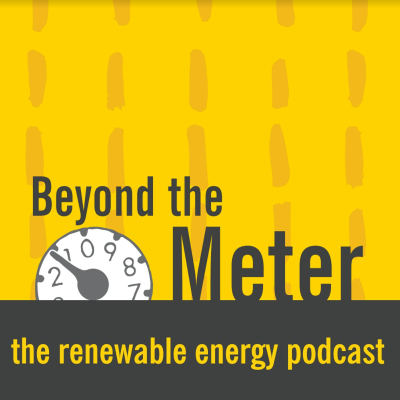
Beyond The Meter
Podcast af Smart Energy Decisions
Begrænset tilbud
1 måned kun 9 kr.
Derefter 99 kr. / månedIngen binding.

Mere end 1 million lyttere
Du vil elske Podimo, og du er ikke alene
Bedømt til 4,7 stjerner i App Store
Læs mere Beyond The Meter
Beyond the Meter addresses timely topics of interest to executives responsible for renewable energy procurement and distributed energy resources at Fortune 1000 companies, higher education and cities. Each episode delivers insights and information that listeners can use to make smarter energy decisions beyond the meter.
Alle episoder
20 episoderIn this season of Beyond the Meter, we’re taking a closer look at the meaningful impact business energy project have on the world around us. Host John Failla is joined by Jay Harris, Director of Data Center Services and Facilities for Clemson University, and Wayne Johnson, Key Segment Manager for Education at Duke Energy Sustainable Solutions. They discuss their organizations’ collaboration on energy infrastructure projects and provide insights into why these projects are critical to the university’s overall success. You will want to hear this episode if you are interested in... * Data operations at Clemson [04:16] * Duke Energy’s role in Clemson’s upgrades [08:10] * The partnership structure [11:38] * Flexible contracts that grow as the business need grows [15:54] * Impactful Projects [21:11] * Major benefits of Duke Energy partnerships [28:23] * “Outsourcing vs right-sourcing” * Key lessons and tips for innovative energy [33:07] * Advice for the academic sector [37:00] The Journey to Success In 2007, due to a breaker labeling error, Clemson University had both of its 20-year-old UPS (uninterruptible power supply) o out. That incident led the university to prioritize upgrades. The university would have needed several years to do the research required to fully understand the design and procurement to get the upgrades done. This is when Clemson turned to Duke Energy for guidance. The university started the conversation with Duke Energy in April of 2007. By mid-November, the university had a new generator, two new UPSs, 250-ton air-cooled water chiller, and four new computer room air handlers. The university went from piecemealing together their strategy to a fully functioning infrastructure. A Board-Approved Financing Option Clemson University worked with Duke Energy to identify areas that are ready to be improved or equipment that needs to be replaced. The university signed a 10-year agreement with Duke Energy and amortizes the cost across the length of that agreement essentially transferring CapEx to OpEx. Instead of needing the funds upfront to purchase and install equipment, the contract spreads the cost across 10 years. This structure has made budgeting a lot easier for the university. Approval is easier with an amortization schedule vs. obtaining approval for millions of dollars upfront. Most university campuses are struggling with deferred maintenance costs, especially in facilities. Now Clemson University’s facilities team can propose a solution that removes them from the CapEx competition on campus in exchange for a little more OpEx. Not only will this help with resiliency, sustainability, and efficiency initiatives now, but it will also make sure those goals deliver across the lifespan of those assets. An innovative business model Part of what makes Duke Energy’s contracts so successful is their flexibility. Duke Energy has its own in-house structuring, counsel, engineering, and operations teams. These teams determine what each client is good at, and then Duke Energy prices and builds solutions around what the customers do and what they need. As a company, Duke Energy wants to have relationships with customers working collaboratively to deliver solutions across time because that’s where the most significant energy savings and reliability services outcomes are found. Considerable savings can occur when working together to develop these contracts and partnerships. Rather than simply selling a product and leaving the rest to the customer, Duke Energy is involved in the design, build, operations and maintenance phases. Working through these phases with a single vendor can save money while achieving the comprehensive outcomes, including sustainability, reliability, and resiliency. Resources & People Mentioned * Case Study: Clemson University Information Technology Center [https://sustainablesolutions.duke-energy.com/resources/clemson/] * Clemson University [http://www.clemson.edu/] Note: The above project was performed by Duke Energy’s Business Energy Services team. Duke Energy Sustainable Solutions leverages these specialists to deliver innovative solutions to customers. Connect With Our Guests Jay Harris - Director of Data Center Services and Facilities for Clemson University Jay Harris has been the Director of Data Center Services and Facilities for Clemson University’s Computing and Information Technology (CCIT) group since 2009. Among his responsibilities are the oversight and daily operations of Clemson’s two data center facilities, totaling approximately 19,000 square feet of white space, along with directing the enterprise print facility. The primary data center, with an aggregate feed of 5MW, houses a 1.4+ PFLOP supercomputer cluster dedicated to supporting research faculty at Clemson. Mr. Harris has been with Clemson since 1998, working as a Unix systems administrator with the Computer Science Department before moving to CCIT in 2007 as the hardware architect. Prior to that time, he was a “professional” student. Mr. Harris earned two BS degrees in Chemistry and Computer Science/Mathematics and a BA degree in Mathematics from Wofford College (Spartanburg, SC) in 1993, an MA degree in Analytical Chemistry from the University of North Carolina at Chapel Hill in 1996, and an MS degree in Computer Science from Clemson University in 2001. * Follow Jay Harris on LinkedIn [https://www.linkedin.com/in/jay-harris-34169623/] Wayne Johnson - Key Segment Manager for Education Wayne Johnson is key segment manager for the education segment at Duke Energy Sustainable Solutions and has a wealth of experience in energy innovation and solution finance. He also spent years as a facilities manager and energy executive in higher education. Wayne’s out-of-the-box thinking helps him meet the challenges of energy infrastructure and asset management in education. Wayne designs energy solutions to help meet the needs of all project stakeholders, including facilities leaders, CFOs, presidents, heads of schools, faculty, staff, students and local communities. He uses his unique experience to help schools become more energy efficient, sustainable and viable for the future. Wayne has been invited to speak at conferences and universities across the country about finance innovation for campus energy and sustainability projects. He also works closely with Duke Energy’s Emerging Technology organization to bring behind-the-meter innovation to campuses. Most recently, Wayne has been exploring the role of alternative fuels on campus via pilot project funding. Wayne enjoys international travel, time on the lake and hiking with his family. Wayne has worked as a licensed electrical and general contractor and is an alumnus of Mars Hill University and The University of South Carolina. His master’s degree is in education administration. * Follow Wayne Johnson on LinkedIn [https://www.linkedin.com/in/wjdukeenergy/] Connect With Smart Energy Decisions * https://www.smartenergydecisions.com/ [https://www.smartenergydecisions.com/] * Follow them on Facebook [https://www.facebook.com/smartenergydecisions] * Follow them on Twitter [https://twitter.com/SmartEnergy2020] * Follow them on LinkedIn [https://www.linkedin.com/checkpoint/challengesV2/AQH7GW5VbB-ClAAAAXNuUisSv9E62-3pDwNsTTwKB6u2vJFNKxwTDX33pdd7FSTvI-baTMhRQrq2q3yGniYXlMsr2YwWpcyoXw] Subscribe to Beyond The Meter [https://plinkhq.com/i/1465152450] on Apple Podcasts [https://podcasts.apple.com/us/podcast/feed/id1465152450?at=11lo6V&ct=podnews_podcast], Spotify [https://open.spotify.com/show/2MM8HFl18vlSua7miTjFS8], Google Podcasts [https://podcasts.google.com/?feed=aHR0cHM6Ly9iZXlvbmR0aGVtZXRlci5saWJzeW4uY29tL3Jzcw==] Audio Production and Show notes by PODCAST FAST TRACK https://www.podcastfasttrack.com [https://www.podcastfasttrack.com/]
In this episode of Beyond the Meter, host John Failla is joined by three Duke Energy Sustainable Solutions team members. Mark Adams is the Business Development Manager, Mike York is the Strategic Account Manager, and Wayne Johnson is the Key Segment Manager for Education. These experienced executives walk through practical steps toward gaining approval for resiliency projects. You will want to hear this episode if you are interested in... * Understanding the project [02:21] * Making the business case for a project [05:59] * The “Money Authority Need” concept [10:14] * Barriers to communication [15:21] * The DISC profile [20:34] * Building consensus [24:03] * Risk-adjusted cost [30:22] * Before the C-suite meeting [39:58] Making the business case Achieving internal buy-in for energy managers is a common challenge. Many projects miss the mark on this critical first step in making the business case for a project. Fully understanding the project, need, and goal will lead to precisely what’s necessary for a project to achieve that goal. Starting with the end in mind and understanding the process will direct how the project is communicated. Everyone has different communication styles, so choosing the right person to present varies by initiative. Typically, engineers can speak to engineers and do a reasonably good job communicating with finance. Still, many engineers would find it a challenge to translate an initiative into business results and talk to executives. The presentation must be succinct, with further data ready for when there are deeper questions. The goal is to give people the information they need to make a reasonable decision and not drown them in detail and minutiae. With data, details can become muddled in the impact, degrading the target outcome’s importance. Begin with consensus The default starting point for many projects has been receiving approval from finance. However, finance tends to wait to follow after the authority has expressed initial interest. At that time, a higher priority is placed on the project, and the project will receive more support. The entry point has to be with the individual with the need. Finance tends to look for a simple payback or some framework that may not apply well regarding the replacement of assets. The presenter will need to present the initiative in such a way as to anticipate and overcome objections. Finance finds comfort in consensus. If approached with a project that already has people from various departments working together to push it forward, finance is much more likely to join. Finance will need cost comparisons, asset lift management expectations, and expenses. Anticipating these questions means knowing the people in finance and how they communicate. Consider the wider audience When proposing a project to your business, the decision-makers are the primary audience. Often overlooked are the people who don’t have the authority to approve a project yet affect how the project proposal is received. Considering these different perspectives and bringing them on board is crucial in making the business case for a project. Success is unlikely if a solution doesn’t receive support from the engineering, facilities, and finance departments. This concept applies in other industries as well. In education, the sustainability officer doesn’t typically have much money to spend or authority to leverage but is influential in the process. Being attuned to the broader audience will help gain the project’s approval and its overall success. Resources & People Mentioned * Duke Energy Sustainable Solutions [https://sustainablesolutions.duke-energy.com/] * com [https://www.discprofile.com/] Connect With Our Guests Mark Adams - Business Development Manager Mark’s experience with Duke Energy and Duke Energy Sustainable Solutions through his multiple roles has given him the opportunity to meet, listen and understand, through countless customer meetings across a wide spectrum of industries, the challenges and the ever-changing world they live and compete in daily. Through these meetings, he has learned that everyone has their own unique issues and challenges. His learned business development skills have given him the opportunity to work with diverse industries on many innovative projects. Mark is married to Samona for 35 years and has a 31-year-old married son named Landon. Mark is an avid golfer and loves working in his yard. * Follow Mark Adams on LinkedIn [https://www.linkedin.com/in/emarkadams/] Mike York - Strategic Account Manager Michael York has spent the majority of the past thirty years as an executive responsible for running operations with revenues between $275-$700M annually. During this period, he has managed capital budgets, and engineering staff and has successfully launched numerous service offerings. In addition to these responsibilities he has spoken at events such as Gartner Group conferences, North Carolina State University Executive Roundtable, Minority Economic Forum events and served on the Minority Competitiveness council under the US Department of commerce. He has authored the book Reset, numerous white papers and worked with the VA, Minority Entrepreneurial Council and Raleigh Rescue Mission. Mike is a graduate of the Strategic Leadership Institute at Villanova University, Adizas Institute and Murray State University. Currently, he works for Duke Energy Sustainable Solutions in the area of sales enablement to facilitate complex deals and build compelling business cases for business developers and customers. * Follow Mike York on LinkedIn [https://www.linkedin.com/in/mikewyork/] Wayne Johnson - Key Segment Manager for Education Wayne Johnson is key segment manager for the education segment at Duke Energy Sustainable Solutions and has a wealth of experience in energy innovation and solution finance. He also spent years as a facilities manager and energy executive in higher education. Wayne’s out-of-the-box thinking helps him meet the challenges of energy infrastructure and asset management in education. Wayne designs energy solutions to help meet the needs of all project stakeholders, including facilities leaders, CFOs, presidents, heads of schools, faculty, staff, students and local communities. He uses his unique experience to help schools become more energy efficient, sustainable and viable for the future. Wayne has been invited to speak at conferences and universities across the country about finance innovation for campus energy and sustainability projects. He also works closely with Duke Energy’s Emerging Technology organization to bring behind-the-meter innovation to campuses. Most recently, Wayne has been exploring the role of alternative fuels on campus via pilot project funding. Wayne enjoys international travel, time on the lake and hiking with his family. Wayne has worked as a licensed electrical and general contractor and is an alumnus of Mars Hill University and The University of South Carolina. His master’s degree is in education administration. * Follow Wayne Johnson on LinkedIn [https://www.linkedin.com/in/wjdukeenergy/] Connect With Smart Energy Decisions * https://www.smartenergydecisions.com/ [https://www.smartenergydecisions.com/] * Follow them on Facebook [https://www.facebook.com/smartenergydecisions] * Follow them on Twitter [https://twitter.com/SmartEnergy2020] * Follow them on LinkedIn [https://www.linkedin.com/checkpoint/challengesV2/AQH7GW5VbB-ClAAAAXNuUisSv9E62-3pDwNsTTwKB6u2vJFNKxwTDX33pdd7FSTvI-baTMhRQrq2q3yGniYXlMsr2YwWpcyoXw] Subscribe to Beyond The Meter [https://plinkhq.com/i/1465152450] onApple Podcasts [https://podcasts.apple.com/us/podcast/feed/id1465152450?at=11lo6V&ct=podnews_podcast], Spotify [https://open.spotify.com/show/2MM8HFl18vlSua7miTjFS8], Google Podcasts [https://podcasts.google.com/?feed=aHR0cHM6Ly9iZXlvbmR0aGVtZXRlci5saWJzeW4uY29tL3Jzcw==]
This episode is made in partnership with Duke Energy Sustainable Solutions. In this season of Beyond the Meter, we’re taking a closer look at the meaningful impact renewable energy projects have on the world around us. In this episode, host John Failla is joined by Darrell Booker, Corporate Affairs Specialist leading the Nonprofit Tech Acceleration Program for Black and African American Communities (NTA) at Microsoft Philanthropies, Cheryl Comer, Senior Strategic Account Manager - Duke Energy, and Tracy Woods, VP, Operations - American Association of Blacks in Energy (AABE), to talk about their collaborative efforts on the recently created Diversity In Clean Energy (DiCE) initiative. DiCE, a program to advance equity in clean energy, is an initiative sponsored by Duke Energy’s Strategic Account Management Program. Listen in to learn more about the progress being made to promote diversity in the energy industry. You will want to hear this episode if you are interested in... * AABE’s current activities and work [07:37] * Microsoft’s Nonprofit Tech Acceleration Program [16:26] * Duke Energy’s Diversity in Clean Energy (DiCE) Program and NTA for Black and African American Communities at Microsoft Philanthropies [20:39] * The benefit of effective collaboration [25:26] * The roles of the organizations in DiCE [36:46] * The potential of the new DiCE | AABE platform [44:17] * Making America stronger through diversity [51:54] The American Association of Blacks in Energy For nearly 45 years, the American Association of Blacks in Energy (ABBE) has focused on energy policy and the impact of those policies on communities of color. They work on policies and professional development to ensure that their members can be cultural ambassadors in the communities where they live and work. AABE receives many calls from employers seeking diverse talent. To serve this need, they provide scholarships and programs for high school and middle school students interested in careers in the energy field, job postings through their newly revamped Career Center, and numerous programs like Black Energy Awareness Month. The Diversity in Clean Energy (DiCE) Initiative DiCE is a program sponsored by Duke Energy to drive visibility and open doors of opportunity for diverse suppliers in the clean energy field. At Duke Energy, DE&I (diversity, equity, and inclusion) is a business imperative inspiring how they work with employees, customers and their communities. They’re taking intentional action for the good of both the community and business. The idea for DiCE was sparked by a request from T-Mobile via their Energy and Sustainability Program Manager, Amy Bond, who asked Cheryl what Duke Energy was doing to identify, train, track and utilize diverse suppliers. This question inspired Cheryl to open the conversation to her other strategic accounts, as she knew they would all benefit from this conversation around diversity, equity, inclusion, and how that relates to clean energy. Through these discussions, she realized that there was ample opportunity, interest and need for the resources supported by the DiCE initiative. Collaboration in the energy industry The energy industry is in the midst of a massive transformation. As one of the largest utilities in the United States, Duke Energy has an obligation to provide reliable, affordable, and increasingly cleaner energy to customers and communities. One of the most efficient ways to initiate change is by cross-industry leaders coming together, pooling resources, and solving complex problems. While many corporations realize that they want to work with diverse suppliers, they don’t know where to start. The ultimate goal of the DiCE | AABE platform is to facilitate the inclusion of diverse suppliers into mainstream corporate supply chains and to eliminate systemic barriers. Everyone in this collaboration has something different to bring to the table: Duke Energy has the means, AABE has the connections, and Microsoft has the technology. As the DiCE | AABE platform continues to grow, there are endless opportunities to fulfill its mission and we look forward to seeing the positive effect it will have in the clean energy space. Resources & People Mentioned * American Association of Blacks in Energy (AABE) [https://www.aabe.org/] * AABE Career Center [https://www.aabe.org/index.php?component=pages&id=1764] * Nonprofit Tech Acceleration for Black and African American Communities Program [https://www.microsoftpartnercommunity.com/t5/Announcements/LAUNCH-Nonprofit-Tech-Acceleration-for-Black-and-African/m-p/28845] * Amy Bond - Energy & Sustainability Program Manager - T-Mobile [https://www.linkedin.com/in/bondamybond] * Melody B. - Charlotte, North Carolina, United States | Professional Profile [https://www.linkedin.com/in/melodybirmingham] Connect With Our Guests Darrell Booker - Corporate Affairs Specialist leading the Nonprofit Tech Acceleration Program for Black and African American Communities (NTA) at Microsoft Philanthropies Meet Darrell, your “techie’s favorite techie” who leads one of Microsoft’s most important racial equity commitments, the Nonprofit Tech Acceleration of Black and African American Communities, a national program designed at leveling the tech playing field for nonprofits serving our most underserved communities. Prior to leading this program, Darrell served in an advisor role helping the world’s largest nonprofits such as The Bill & Melinda Gates Foundation, American Cancer Society, and the Salvation Army on their digital transformation to the cloud. Darrell has served in CIO and CTO roles in the past leading teams of developers in nonprofit, primarily child welfare, as well as other industries such as automotive and banking. Darrell also has an entrepreneurial spirit, co-founding a tech startup for the fitness industry used in hundreds of gyms across the U.S. and Canada. * Follow Darrell Booker on LinkedIn [https://www.linkedin.com/in/darrellbooker] Cheryl Comer - Strategic Account Manager in the Sales and Relationship Management Organization at Duke Energy Cheryl Comer is a Senior Strategic Account Manager in the Sales and Relationship Management organization at Duke Energy. She is responsible for developing and sustaining long-term strategic customer relationships for mutual growth, profitability, trust, loyalty, and risk management. Her assigned strategic accounts are FedEx, Kroger, Microsoft, and T-Mobile. Cheryl brings a wealth of experience from the education and legal industries. In addition to teaching middle school and high school students music theory, solfeggio, string, symphony orchestra, and music history, she served as a high school principal of an alternative school in Phoenix, Arizona. She managed a school of 350 students and 30 staff members. During her tenure as principal, she learned to effectively balance considerations from competing stakeholders such as state mandates, instructional and support staff, parents, students, and community. Under her leadership, graduation rates and test scores increased. Cheryl is also a licensed attorney in North Carolina and Louisiana and practiced law at a mid-size, litigation boutique in downtown New Orleans before joining Duke Energy in 2018. She continues to practice law in the capacity of a pro bono attorney with Legal Aid of North Carolina and often lends a hand to family and friends when in need of sound legal advice. She is a community activist in Gaston County and Diversity, Equity, and Inclusion champion. Cheryl’s first love, however, is the cello. She began playing in an exploratory program in the 4th grade and never stopped! She plays the violin, viola, cello, and bass but is proficient on cello. Cheryl is a graduate of Interlochen Arts Academy and the University of Michigan (where she won principal cellist of the most advanced orchestra). She earned a master’s degree in Educational Leadership from Western Michigan University and a Juris Doctor from the University of Detroit School of Law. She has been a licensed attorney since 2009. Cheryl’s passions include international travel, spending time on the beach with her family, and enjoying the zest of life. She grew up in Kalamazoo, Michigan, has three children, and resides in Charlotte, N.C. * Follow Cheryl Comer on LinkedIn [https://www.linkedin.com/in/alwaysseekingabetterversionofme?trk=people-guest_people_search-card] Tracey Woods - VP of Operations at American Association of Blacks in Energy (AABE) Tracey Woods is an energy industry veteran with over 3 decades of experience. He currently runs operations for the American Association of Blacks in Energy (AABE), a policy non-profit serving 2,000 members through 36 chapters across the US. Before coming on staff at AABE, he ran the Construction Services division at Con Edison in NYC. His teams were instrumental in restoring the steam loop after Superstorm Sandy devastated the city. The Empire State Building, The Museum of Modern Art, and the United Nations all use steam for winter heating and summer cooling. He led the effort to ensure these and other businesses had heat for the winter of 2012 after the unprecedented devastation from the most powerful storm to ever hit NYC. His leadership skills had been developed commanding substation operations at Jersey Central Power & Light, and through multiple operations management roles at Exelon utilities in Chicago and Philadelphia. He is a degreed electric engineer who has also worked as a lineman, substation operator, facilities supervisor, and utility trainer. He is a fan of the great outdoors, jazz, and R&B music, and is working off his bucket list of travel destinations. * Follow Tracey Woods on LinkedIn [https://www.linkedin.com/in/alphaman1] Connect with Duke Energy Sustainable Solutions * https://sustainablesolutions.duke-energy.com/ [https://sustainablesolutions.duke-energy.com/] * Follow DESS on LinkedIn [https://www.linkedin.com/showcase/duke-energy-sustainable-solutions/] * Follow DESS on Youtube [https://www.youtube.com/channel/UCcppNdN5HgeZGJVqH6UWQvg] Connect With Smart Energy Decisions * * https://www.smartenergydecisions.com/ [https://www.smartenergydecisions.com/] * Follow them on Facebook [https://www.facebook.com/smartenergydecisions] * Follow them on Twitter [https://twitter.com/SmartEnergy2020] * Follow them on LinkedIn [https://www.linkedin.com/checkpoint/challengesV2/AQH7GW5VbB-ClAAAAXNuUisSv9E62-3pDwNsTTwKB6u2vJFNKxwTDX33pdd7FSTvI-baTMhRQrq2q3yGniYXlMsr2YwWpcyoXw]
In this episode of Beyond the Meter, host John Failla is joined by Terri Dalmer, Vice President of Solar Business Development at CleanChoice Energy, and Owen Grant, Business Development Manager at Duke Energy Sustainable Solutions. They discuss the broad impact community solar can have on businesses and diverse communities nationwide. You won’t want to miss the insights and reflections they have to share from their over 30 years of experience. This episode is made in partnership with Duke Energy Sustainable Solutions. You will want to hear this episode if you are interested in... * Growth of community solar [03:52] * Massachusetts’ Rowtier project [08:27] * Duke Energy and CleanChoice [11:28] * Requirements unique to Massachusetts [13:29] * What involved Duke Energy in solar? [15:35] * The benefits of community solar projects [19:25] * The future of community solar [24:23] What is community solar? Community solar consists of facilities that produce less than five megawatts of electrical capacity. It allows residents, small businesses, and other organizations, such as municipalities, to receive credit on their electricity bills for the power produced by these solar arrays. It differs from residential solar in that it is an off-site project with no financial investment from a consumer and serves multiple levels of subscriber offtake. The impressive growth of solar is due to the diligent policy work at the state level, where legislation is being supported to expand the renewable market. The dynamics of state programs are a significant influence on solar’s success. Currently, about 19 states and DC have a wide variety of programs. Some of the newest markets coming on board currently are Virginia, New Mexico, and Pennsylvania. Solar is a dynamic and growing market that offers a lot of opportunities. Community solar projects in Massachusetts Massachusetts provides an excellent opportunity to work on ground-mount, front-of-meter projects. A nice feature of the Massachusetts program is that these projects can be operated either as community solar or by directly selling electricity to utility companies. Duke Energy found this quite an attractive project, deciding that the community solar route made more sense financially. That’s how Duke came to work with CleanChoice as a subscription management company to bring in small customers. Duke Energy and CleanChoice Duke Energy is a best-in- class company, so they needed a best-in-class collaborator to help with their community solar pilot project. They’ve been pleased with the relationship with CleanChoice and their ability to help Duke Energy navigate the ins and outs of the community solar program’s SMART (Solar Massachusetts Renewable Target) element as well as the utility coordination. Together they’ve created a model project that other companies should consider. One of the values of Duke Energy is serving its communities. With community solar, the benefits are kept local. It’s an opportunity for both the small and large customers in a community to participate in the project. Having a large anchor tenant allows the project to open up to customers that might not otherwise be qualified to participate in a solar project. The local element of these projects provides a kind of equity of access to renewables as part of the energy transition. Resources & People Mentioned * Solar Energy Industries Association: SEIA [https://www.seia.org/] * Alternative On-Bill Credit FAQ April 2019 [https://www.mass.gov/doc/alternative-on-bill-credit-faq/download] Connect With Our Guests Terri Dalmer - Vice President of Solar Business Development at CleanChoice Energy Terri Dalmer is Vice President of Solar Business Development at CleanChoice Energy, responsible for overseeing a community solar management services portfolio as well evaluating market expansion opportunities and partnerships with solar as it relates to both management services and project development. Ms. Dalmer has over 20 years of experience in the energy and commodities fields with sales roles at Morgan Stanley and ConEdison Solution. She led the commercial renewable energy retail sales departments for both Crius and CleanChoice, encouraging mid-to-large-sized organizations to embrace green products and advance corporate sustainability initiatives. Terri is a graduate of Trinity College, CT, with a Bachelor of Arts degree in History. * Follow Terri Dalmer on LinkedIn [https://www.linkedin.com/in/terridalmer] Owen Grant - Business Development Manager at Duke Energy Sustainable Solutions Owen Grant is Business Development Manager at Duke Energy Sustainable Solutions where he is responsible for the development and acquisitions of small utility and community solar projects. Mr. Grant led Duke Energy’s first commercial community solar project which came online in 2020. This effort included project acquisition, internal pilot program approval, and external stakeholder engagement. His prior experience includes institutional equity sales at Oppenheimer, and over 13 years of experience in renewable energy including wind and solar energy development, and financial management. Owen has a B.A. from Hamilton College and an MBA from IESE Business School in Barcelona, Spain. * Follow Owen Grant on LinkedIn [https://www.linkedin.com/in/owen-grant-7599136] Connect with Duke Energy Sustainable Solutions * https://sustainablesolutions.duke-energy.com/ [https://sustainablesolutions.duke-energy.com/] * Follow DESS on LinkedIn [https://www.linkedin.com/showcase/duke-energy-sustainable-solutions/] * Follow DESS on Youtube [https://www.youtube.com/channel/UCcppNdN5HgeZGJVqH6UWQvg] Connect With Smart Energy Decisions * https://www.smartenergydecisions.com/ [https://www.smartenergydecisions.com/] * Follow them on Facebook [https://www.facebook.com/smartenergydecisions] * Follow them on Twitter [https://twitter.com/SmartEnergy2020] * Follow them on LinkedIn [https://www.linkedin.com/checkpoint/challengesV2/AQH7GW5VbB-ClAAAAXNuUisSv9E62-3pDwNsTTwKB6u2vJFNKxwTDX33pdd7FSTvI-baTMhRQrq2q3yGniYXlMsr2YwWpcyoXw] Subscribe to Beyond The Meter [https://plinkhq.com/i/1465152450] onApple Podcasts [https://podcasts.apple.com/us/podcast/feed/id1465152450?at=11lo6V&ct=podnews_podcast], Spotify [https://open.spotify.com/show/2MM8HFl18vlSua7miTjFS8], Google Podcasts [https://podcasts.google.com/?feed=aHR0cHM6Ly9iZXlvbmR0aGVtZXRlci5saWJzeW4uY29tL3Jzcw==] Audio Production and Show notes by PODCAST FAST TRACK https://www.podcastfasttrack.com [https://www.podcastfasttrack.com/]
This episode is made in partnership with Duke Energy Sustainable Solutions. In this season of Beyond the Meter, we’re taking a closer look at the meaningful impact renewable energy projects have on the world around us. Industry guests discuss how their cleaner energy transitions are driving change, both within their organization and the larger community. Our guest for this episode is Diana Kotler, Executive Director at Anaheim Transportation Network. Host John Failla and Diana discuss one of the hottest topics in the industry: fleet electrification. Diana has extraordinary insights and experience on the topic that we’re excited to share. Listen in to learn more. You will want to hear this episode if you are interested in... * The drivers for Anaheim Transportation Network [04:00] * The community and social benefits of electrification [10:01] * Anaheim’s transportation fleet [13:57] * Community reactions to electric transportation [15:50] * The infrastructure needed for electrification [18:06] * The benefit of microgrids [25:52] * Duke Energy Sustainable Solutions’s role in Anaheim [28:45] * Obstacles in expansion [31:12] * The finances of electrification [39:01] Early motivation for electrification Diana is from Southern California, which is known to have the worst air quality in the nation. To ensure that the air remains liveable and breathable, the City of Anaheim had to find alternatives to fossil fuels. They looked to electrification in order to improve air quality and ensure that their developments would allow the city to continue to depend on tourism and convention business. This combined approach created the opportunity to generate local revenues and taxes, which, in turn, provide services to the community. Interestingly, while the electrification effort in Anaheim started with a focus on air quality and health benefits, most organizations today are getting involved because of the need to decarbonize operations. While they did discuss fossil fuels and reduced carbon footprint, those were just peripheral discussions at the time. Diane says it doesn’t matter so much where the emphasis is placed, as long as the work provides a better environment for future generations. Community impact Anaheim is on its way to becoming the largest operator of electric buses in Southern California. The city is also beginning to integrate some twelve-passenger electric vans into the fleet for on-demand services that don’t require as much capacity as a bus. They also have 10 slow-speed smaller vehicles that operate in neighborhoods connecting schools, libraries, and eateries downtown. Altogether the city serves about 10 million passengers annually. The service for the smaller vehicles is called FRAN: Free Rides Around the Neighborhood. It is based in the Colony district of the city, which is rooted in tradition and history. When FRAN was introduced in the neighborhood, it was an immediate success. As FRAN began to go deeper into the neighborhoods, people started asking when it could serve this park or that area. People were fighting to have FRAN serve their community. While capacity declined due to the pandemic, service is slowly but surely being reinstated. Overcoming challenges in electrification The technical expertise and guidance of Duke Energy Sustainable Solutions has been immeasurably valuable to the City of Anaheim. DESS had the in-depth experience connecting a public sector participant with private capital that the city didn’t have the reach to achieve. Duke Energy Sustainable Solutions supports operations and ensures that the infrastructure is robust. The partnership of Duke Energy Sustainable Solutions and the City of Anaheim means that the Anaheim Transportation Network operates not only today but also twenty years into the future. As more vehicles are added to Anaheim’s fleet, infrastructure needs to adapt. For example, if the city were to switch to another bus manufacturer, the charging technology and chargers would be different. Therefore, standards will be necessary at some point so that any brand of vehicle can use any charging station. Acceptance of electrification is another challenge. At the beginning of electrification, there was a lot of opposition because people were afraid of this unknown entity. Over time, that hesitancy has faded, and people are embracing technology. As with any new technology, there is a learning process of people adapting to change, and change is the hardest thing to accomplish. Resources & People Mentioned * Anaheim Public Utilities [https://www.anaheim.net/226/Public-Utilities] * FRAN [http://www.ctrcityanaheim.com/fran/] * Anaheim Debuts Unique, All-Electric Microtransit Service [https://commercial.polaris.com/en-us/news/gem/anaheim-debuts-unique-all-electric-microtransit-service/] * AMPLY Power - Fleet Charging Simplified [https://amplypower.com/] * Duke Energy Sustainable Solutions: Top Renewable Energy Companies [https://sustainablesolutions.duke-energy.com/]l * Arrival | Zero-emission solutions [https://arrival.com/us/en] Connect With Our Guest Diana Kotler - Executive Director at Anaheim Transportation Network Ms. Kotler’s career includes over 25 years of experience in the transportation field. She began with the City of Anaheim overseeing transportation planning efforts. Since 2003, Ms. Kotler serves as the Executive Director for the Anaheim Transportation Network (ATN). ATN’s mission is to provide public transit services for the residents, visitors, and employees of Anaheim and surrounding communities. Ms. Kotler is a graduate of California State University, Long Beach (CSULB) with an undergraduate degree in Business Administration and Finance. Ms. Kotler also earned her graduate degree from California State University, Long Beach with a concentration in Economics and Urban Planning. * Follow Diana Kotler on LinkedIn [https://www.linkedin.com/in/diana-kotler-1676398] Connect with Duke Energy Sustainable Solutions * https://sustainablesolutions.duke-energy.com/ [https://sustainablesolutions.duke-energy.com/] * Follow DESS on LinkedIn [https://www.linkedin.com/showcase/duke-energy-sustainable-solutions/] * Follow DESS on Youtube [https://www.youtube.com/channel/UCcppNdN5HgeZGJVqH6UWQvg] Connect With Smart Energy Decisions * https://www.smartenergydecisions.com/ [https://www.smartenergydecisions.com/] * Follow them on Facebook [https://www.facebook.com/smartenergydecisions] * Follow them on Twitter [https://twitter.com/SmartEnergy2020] * Follow them on LinkedIn [https://www.linkedin.com/checkpoint/challengesV2/AQH7GW5VbB-ClAAAAXNuUisSv9E62-3pDwNsTTwKB6u2vJFNKxwTDX33pdd7FSTvI-baTMhRQrq2q3yGniYXlMsr2YwWpcyoXw] Subscribe to Beyond The Meter [https://plinkhq.com/i/1465152450] onApple Podcasts [https://podcasts.apple.com/us/podcast/feed/id1465152450?at=11lo6V&ct=podnews_podcast], Spotify [https://open.spotify.com/show/2MM8HFl18vlSua7miTjFS8], Google Podcasts [https://podcasts.google.com/?feed=aHR0cHM6Ly9iZXlvbmR0aGVtZXRlci5saWJzeW4uY29tL3Jzcw==] Audio Production and Show notes by PODCAST FAST TRACK https://www.podcastfasttrack.com [https://www.podcastfasttrack.com/]

Bedømt til 4,7 stjerner i App Store
Begrænset tilbud
1 måned kun 9 kr.
Derefter 99 kr. / månedIngen binding.
Eksklusive podcasts
Uden reklamer
Gratis podcasts
Lydbøger
20 timer / måned

































